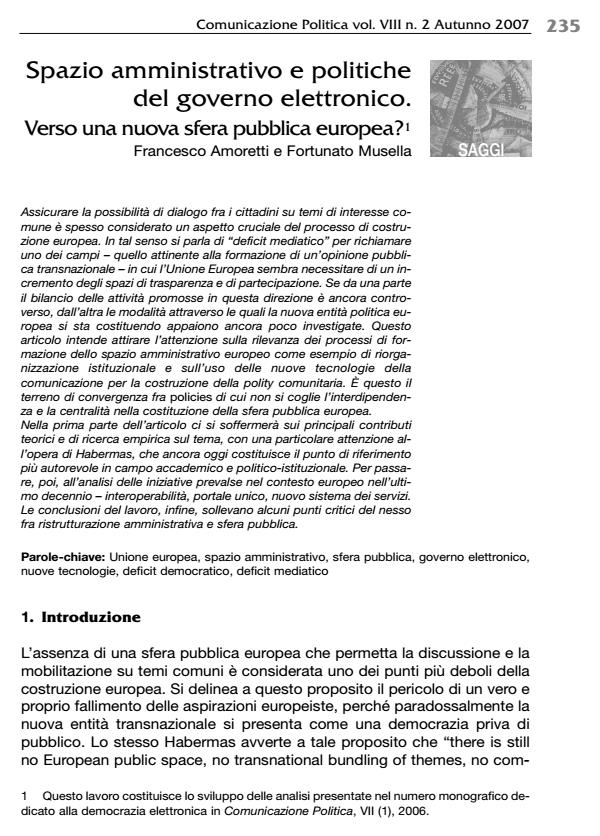Spazio amministrativo e politiche del governo elettronico. Verso una nuova sfera pubblica europea?
Titolo Rivista COMUNICAZIONE POLITICA
Autori/Curatori Francesco Amoretti, Fortunato Musella
Anno di pubblicazione 2008 Fascicolo 2007/2
Lingua Italiano Numero pagine 18 P. 235-252 Dimensione file 122 KB
DOI
Il DOI è il codice a barre della proprietà intellettuale: per saperne di più
clicca qui
Qui sotto puoi vedere in anteprima la prima pagina di questo articolo.
Se questo articolo ti interessa, lo puoi acquistare (e scaricare in formato pdf) seguendo le facili indicazioni per acquistare il download credit. Acquista Download Credits per scaricare questo Articolo in formato PDF

FrancoAngeli è membro della Publishers International Linking Association, Inc (PILA)associazione indipendente e non profit per facilitare (attraverso i servizi tecnologici implementati da CrossRef.org) l’accesso degli studiosi ai contenuti digitali nelle pubblicazioni professionali e scientifiche
Dialogue among citizens on themes of common interest is often considered a crucial issue in the process of European construction. The media deficit strongly poses the challenge of the creation of a transnational public opinion for the need of larger spaces of transparency and participation. Many initiatives have been launched by the European institutions in order to reduce the distance between themselves and the European citizenry. Increasing the transparency of the political process, enhancing the direct involvement and participation of citizens, and improving the quality of opinion formation are among the main imperatives of the emerging European policy discourse. Yet the project of the European Union as a community of communication seems very far to be realized, and the modalities through which the European entity is really forming remain still to be investigated. In this article we will concentrate our attention on the building of a common European administrative space, taking it as an example of an institutional reorganization based on a widespread use of Icts. Indeed, it can been noted a relevant interconnection between the electronic government policy and the attempts of constructing the European Union. Our research will be divided in three main sections. The first portion will analyse the most important theoretical and empirical contributions on the field of European public opinion, with a particular focus on the Habermas’ works. The second part will address political goals and implementation patterns concerning new technologies developed in the European landscape during the last ten years. Finally, some critical remarks on the relationship between the process of administrative restructuring and the public sphere will been provided.
Francesco Amoretti, Fortunato Musella, Spazio amministrativo e politiche del governo elettronico. Verso una nuova sfera pubblica europea? in "COMUNICAZIONE POLITICA" 2/2007, pp 235-252, DOI: